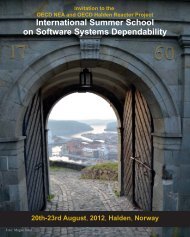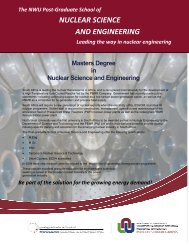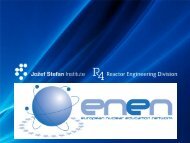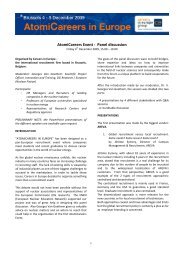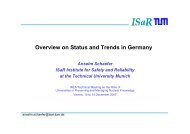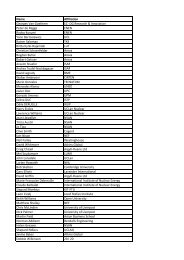Annex I Description of Work (April 2007) - ENEN Association
Annex I Description of Work (April 2007) - ENEN Association
Annex I Description of Work (April 2007) - ENEN Association
- No tags were found...
You also want an ePaper? Increase the reach of your titles
YUMPU automatically turns print PDFs into web optimized ePapers that Google loves.
Euratom 2005-6 – Fixed deadline<br />
Coordination Actions<br />
<strong>ENEN</strong>-II<br />
1-4 Atominstitut de Österreichischen Universitäten (ATI)<br />
The Atominstitut is an inter-university institute founded in 1962 and attached to the Technical<br />
University Vienna. Its main task is to train students in the following fields <strong>of</strong> academic research:<br />
neutron- and solid state physics, nuclear technology and reactor safety, radiochemistry, radiation<br />
protection and dosimetry, low temperature physics and fusion research and X-ray physics. Students<br />
are <strong>of</strong>fered more than 100 specialised theoretical course and 10 practical courses for training in the<br />
above fields and they graduate with Masters - or PhD degree. In addition, due to the proximity <strong>of</strong> the<br />
IAEA there is a close co-operation in the form <strong>of</strong> research projects, training courses, and fellowship<br />
acceptances between the IAEA and the Atominstitut. Staff members <strong>of</strong> the institute are frequently<br />
hired by the IAEA as short-term expert and consultants to be involved in projects in Asia, Africa or<br />
South America. The main instruments for training and education is a 250 kW TRIGA Mark II<br />
reactor, a 2 MeV Van de Graff generator, a Helium liquefaction plant X-ray equipment etc.<br />
Helmuth Böck graduated in 1966 with a Masters Degree in Nuclear Engineering and 1969 with a<br />
PhD in nuclear engineering from the Technical University Vienna. In 1979, he obtained the<br />
Assistant Pr<strong>of</strong>essorship in reactor safety. Since 1967, he is Reactor Manager <strong>of</strong> the TRIGA Mark II<br />
reactor. During his pr<strong>of</strong>essional career he published more than 200 papers in international journals<br />
and international conferences, he carried out more than 40 missions for the IAEA to developing<br />
countries in the fields <strong>of</strong> nuclear engineering, reactor safety and research reactor utilisation He coordinated<br />
and supervised more than 40 Master thesis and 15 PhD thesis projects at the Technical<br />
University <strong>of</strong> Vienna.<br />
1-6 Delft University <strong>of</strong> Technology (DUT)<br />
The Reactor Institute Delft (RID), part <strong>of</strong> the Delft University <strong>of</strong> Technology is the Dutch<br />
universities centre for research and training in which its nuclear reactor, radionuclides ionising<br />
radiation and related expertise play a central role. The institute's activities can be divided into five<br />
categories:<br />
• research aiming at further development <strong>of</strong> the specific IRI facilities and expertise;<br />
• fundamental and applied research using these facilities and expertise;<br />
• provision <strong>of</strong> a home base for experiments at large international radiation sources;<br />
• education and training <strong>of</strong> students and specific pr<strong>of</strong>essional groups;<br />
• routine services.<br />
The fundamental research comprises radiochemistry, radiation chemistry, chemical reaction kinetics<br />
condensed matter physics as well as reactor and neutron physics. The institute employs some 220<br />
persons.<br />
The Section Physics <strong>of</strong> Nuclear Reactors (PNR) focuses its research on the physics and thermalhydraulic<br />
aspects <strong>of</strong> three lines <strong>of</strong> innovative designs <strong>of</strong> nuclear reactors: boiling water reactors<br />
(BWRs) with passive safety features, high temperature gas-cooled reactors (HTRs) and acceleratordriven<br />
subcritical systems (ADSs). Being a university group, exotic designs are being investigated as<br />
well. An example <strong>of</strong> the latter type is a fluidised bed nuclear reactor.<br />
Presently, part <strong>of</strong> the research concentrates on high temperature reactors; especially the long-term<br />
control <strong>of</strong> excess reactivity by means <strong>of</strong> burnable poisons, and system studies to investigate the<br />
dynamic behaviour <strong>of</strong> direct-cycle helium-cooled reactors during normal and abnormal situations.<br />
Experience includes measurements <strong>of</strong> reactivity effects and kinetic parameters at the PROTEUS<br />
facility in Switzerland and at the HTTR in Japan.<br />
As educational activities the staff members <strong>of</strong> the department are lecturing in several reactor physics<br />
subjects and radiation shielding at the Delft University <strong>of</strong> Technology and supervise undergraduate<br />
<strong>Annex</strong> I <strong>Description</strong> <strong>of</strong> <strong>Work</strong> - page 86 <strong>of</strong> 124



